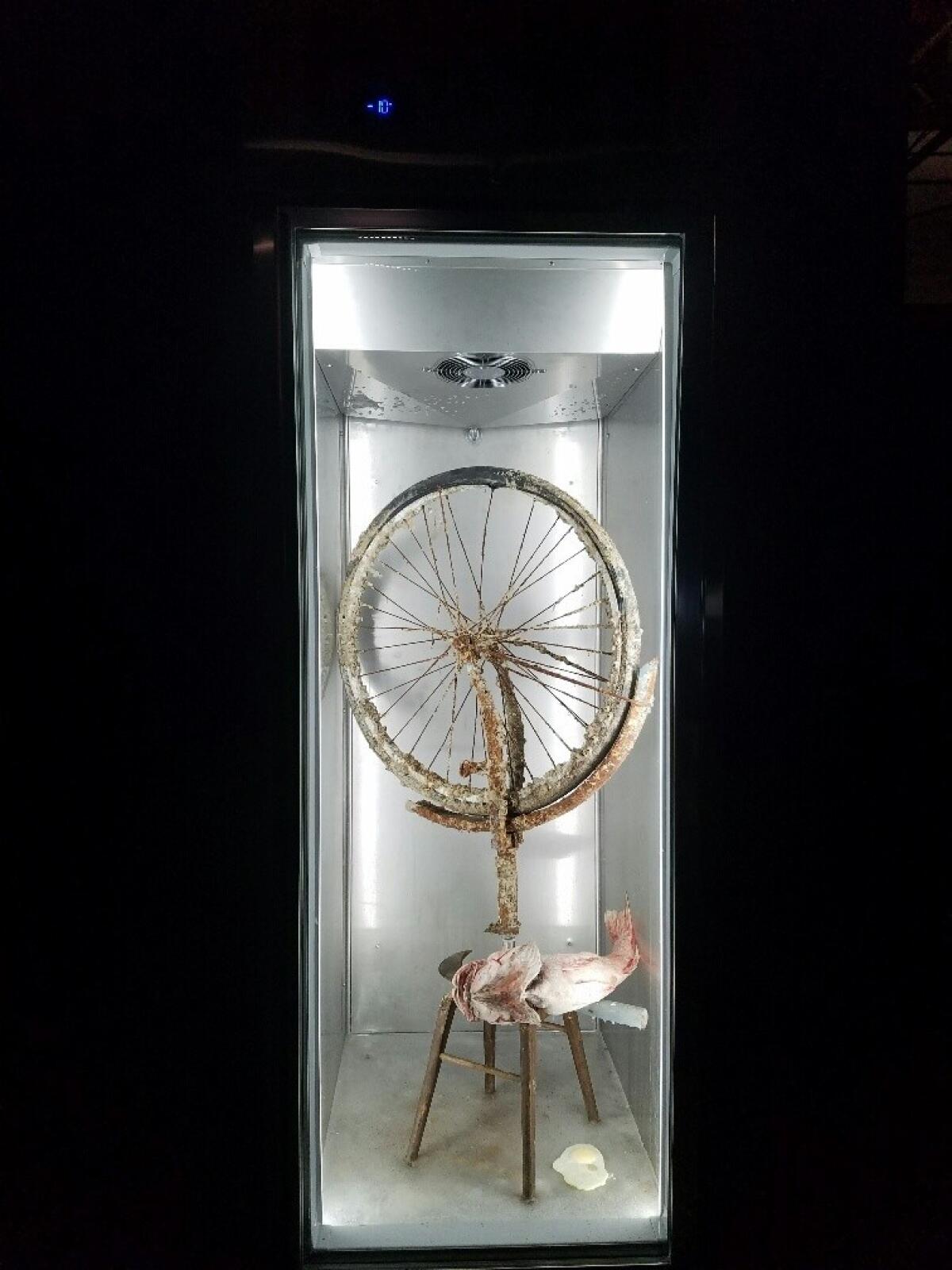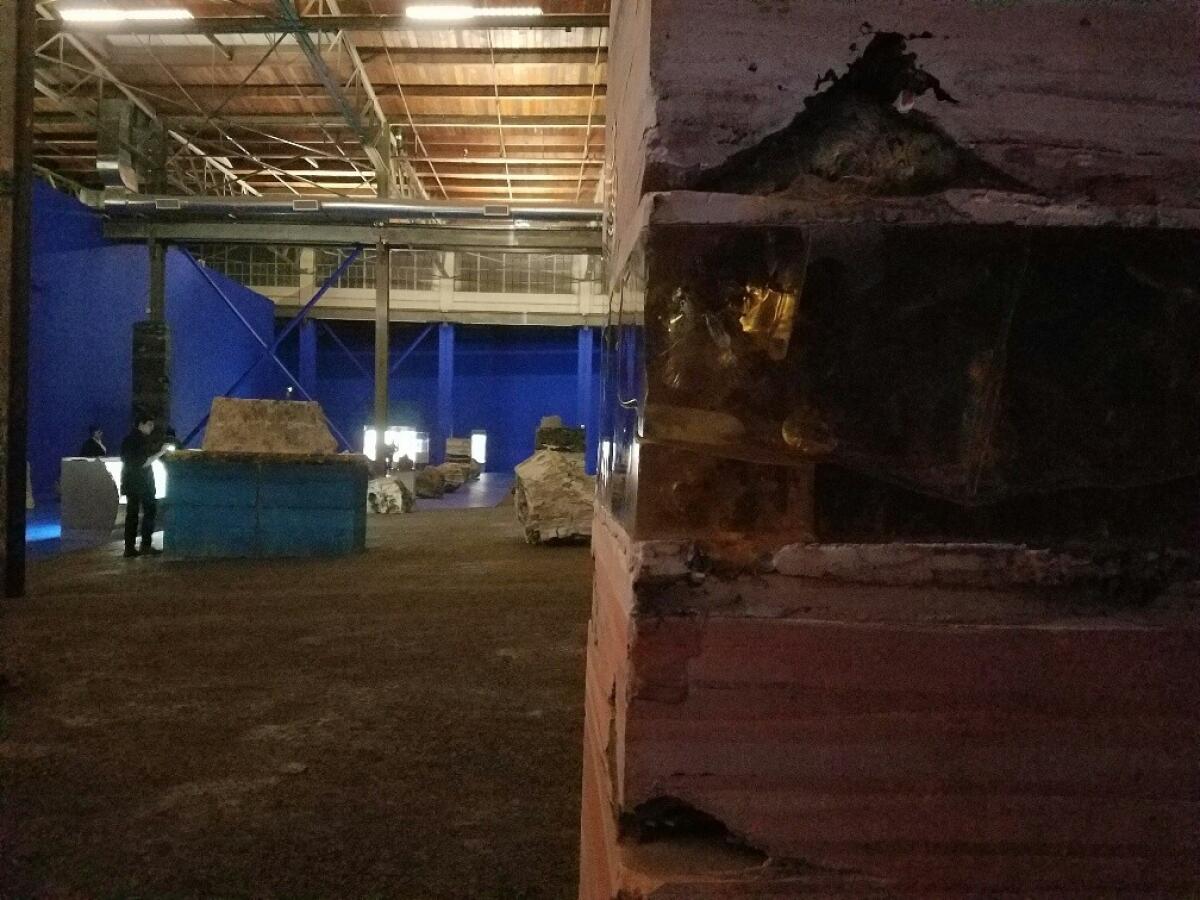Review: Adrián Villar Rojas at the Geffen Contemporary: The art museum, frozen in time
- Share via
A witty moment occurs deep within the massive, immersive installation by Argentine artist Adrián Villar Rojas that fills almost the entire Geffen Contemporary warehouse space in Little Tokyo. The show, organized by Museum of Contemporary Art curators Helen Molesworth and Bryan Barcena, is part of the citywide series, Pacific Standard Time: LA/LA.
Inside a brightly illuminated refrigeration case, the freezing temperature set at 10 degrees below zero, according to its glowing digital thermostat, a disintegrating bicycle wheel affixed atop a ramshackle stool takes incisive aim at the lingering legacy of Marcel Duchamp.
The famous “Bicycle Wheel” sculpture by the Dada imp, made a full century ago, is kept in the forefront of museum culture today through extraordinary, preprogrammed and finally absurd means. Art on ice, so to speak.
Duchamp’s work is like a bottle of milk in the refrigerator whose sell-by date may have arrived somewhere around 1980, the year of Villar Rojas’ birth. In case you miss the point, a dead fish is impaled at the base of the wheel, like some supermarket Saint Catherine of Alexandria.


His sleek and shiny refrigerator is an old-fashioned cabinet of curiosities, re-conceived for a technological age. One of a number scattered throughout the installation, it stands amid big stone boulders, some chiseled and others split in two, as well as tall, skinny monoliths made from sedimentary layers of cast concrete and synthetic amber.
Other refrigerators — commercial, domestic or redolent of a scientific lab — hold artfully arranged displays of tree roots, athletic gear, fish, clothing, feathers, prosthetic limbs, a side of beef, power tools, skeletons and more. Vanitas, a traditional genre of painting and sculpture filled with symbols of death and the inevitability of change, is cleverly transformed into an attractive installation of contemporary objects.
The Geffen’s floor has been raised and covered with a layer of packed dirt, the walls painted royal blue — part deep-sea, part distant sky — to underscore the entire museum as an artificial construction. (If you miss that reference, one gallery’s walls are lined with theater flats, seen from behind.) The theatrical ensemble, heroic but disheveled, suggests the contained ruins of a civilization, natural and cultural, on display for our amusement.
An extended if very familiar meditation on the modern museum, the grandiose installation, titled “The Theater of Disappearance,” suffers from a sense of exhaustion not dissimilar to that of the frozen, dilapidated bicycle wheel so puckishly entombed. “We are proud of our museums,” the great Indian art curator Ananda Coomaraswamy wrote in 1947, “where we display the damning evidence of a way of life that we have made impossible." By now a common sentiment, it is merely repeated in Villar Rojas’ thoroughly academic installation.
Given the obvious expense and herculean labor of the undertaking, partially underwritten by the artist’s dealers in New York and Mexico City, the show, originally scheduled for a four-month run, will now remain at the Geffen for seven months. (After six months, an installation by the artist recently closed on the Metropolitan Museum of Art’s New York rooftop.) The gigantism of the project far outpaces its slender rewards, which shrink further by comparison.
Geffen Contemporary, 152 N. Central Ave., L.A. Through May 13; closed Tuesdays. (213) 626-6222, www.moca.org
Twitter: @KnightLAT
You’ll always find our latest stories at latimes.com/arts.
MORE NEWS AND REVIEWS:
Review: Mike Kelley at Hauser & Wirth
The biggest entertainment stories
Get our big stories about Hollywood, film, television, music, arts, culture and more right in your inbox as soon as they publish.
You may occasionally receive promotional content from the Los Angeles Times.








